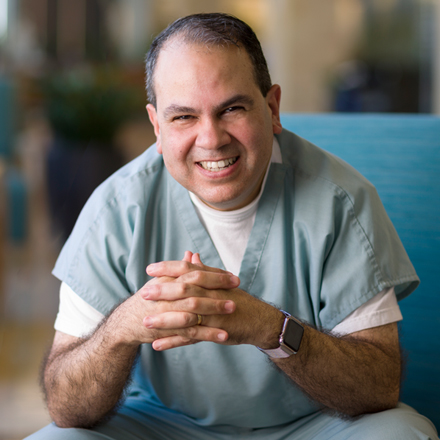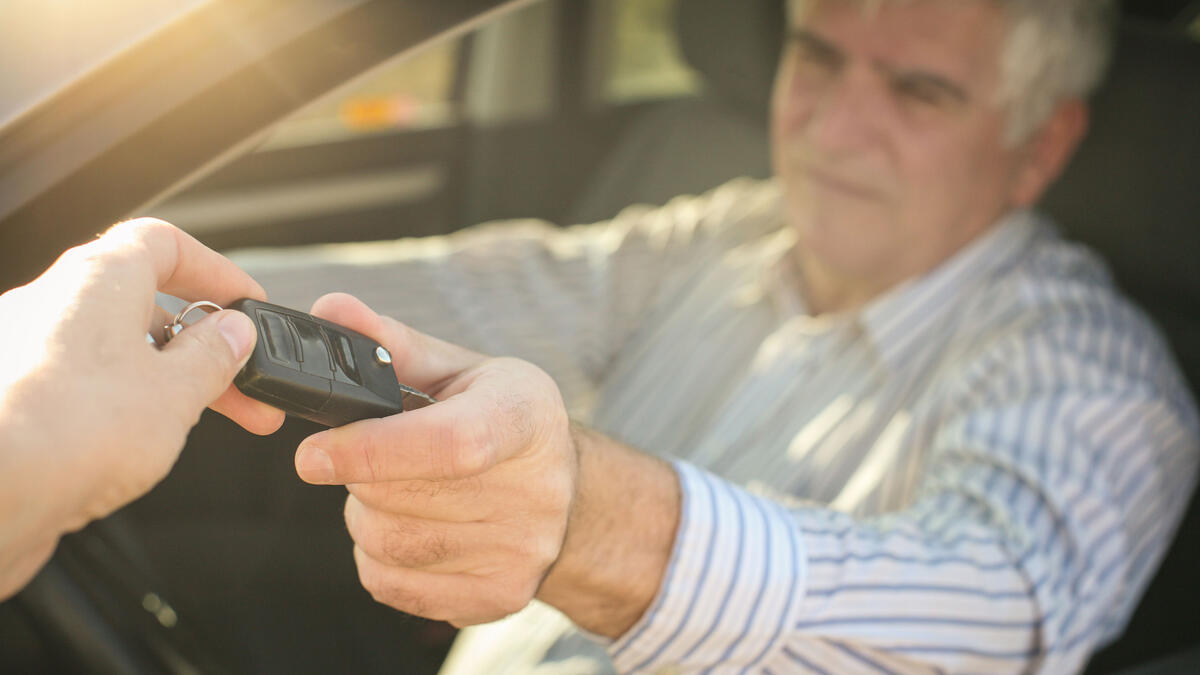It’s a conversation no one wants to have: telling a patient that it’s time to turn in his car keys. Driving means freedom, and for many people it’s part of their identity.
But however uncomfortable, it’s a crucial talk to have when certain health conditions have reached a point where driving is unsafe, both for the patient and others sharing the road.

Joseph Sirven
“I will always remember this very sweet grandmother who told me where I could go when I told her she shouldn’t be driving,” said Joseph Sirven, a physician specializing in seizure disorders and co-creator of an upcoming six-part series at Arizona State University called “We Need to Talk: A Series of Tough Conversations About Health.”
Taking away someone’s keys is the first subject in the series, which launches Oct. 17. A project of the College of Health Solutions’ School for the Science of Health Care Delivery, the series brings in experts to discuss the medical, ethical and legal issues surrounding hot-button health topics such as artificial medical devices, end-of-life care decisions, and medical mistakes.
“People in medicine or in ethical or legal areas all deal with these issues, but we’re not in the same room together,” said Sirven, a new SHCD faculty memberSirven is also a professor of neurology at Mayo Clinic School of Medicine and an adjunct faculty member of the Walter Cronkite School of Journalism and Mass Communication at ASU.. “We’re talking about them in different places, and our approaches don’t always get us to the same place, but we’re supposed to be doing what we do for the individual person. These talks give us an opportunity to put all the vantage points together.”
Sirven created the series series with School for the Science of Health Care Delivery colleagues Greg Mayer and Swapna Reddy. Their mission is to bring together ASU units, such as Cronkite School of Journalism and Mass Communication, the Sandra Day O’Connor College of Law and the College of Health Solutions, and the medical community at large to examine important issues in health care and offer solutions.
Sirven spoke with ASU Now about Tough Conversations, which launches Oct. 17 (event details at the end of this story).
Question: What do you hope happens with this series?
Answer: I hope it realistically reflects the way how, when the doors are shut, the very unfiltered way people talk about these things. Like, for the topic about driving, I used to think that wasn’t a very important topic, medically speaking. My specialty is seizures, and I thought my goal would be discussing with my patients how to cure or manage their condition, but it turns out that their ability to drive is the thing they are most concerned about. That drives the conversation, no pun intended. They get animated. They get upset. The number one reason why people do elective brain surgery is so that they can get a driver’s license. Driving is everything.
Q: How many of these topics are based on personal experience?
A: All of them. I’ve been told off on every one of these issues we’re discussing. I will always remember this very sweet grandmother who told me where I could go when I told her she shouldn’t be driving [laughs].
These are conversations that aren’t contrived. I’m getting this while I’m standing in the middle of Starbucks. One time a barista at Starbucks starting talking to me about her elderly father who suffered from dementia and had just gotten word that he might have kidney cancer. She’s wanting to know about palliative care and whether or not it’s OK to pursue a lot of care. And she’s crying and asking my opinion.
This is real life. This is how people talk and what they’re asking about. We want to have the conversations that real people are having, but we want the conversations that we’re having to move us somehow toward a solution.
Q: Can you give us a preview of some of the topics you’ll be discussing and a little about who will be speaking?
A: Joseph Drazkowski is our first speaker for the Can I Drive discussion. He’s a neurology doctor and is on the medical advisory board at the Arizona Department of Transportation. He has published extensively about driving and medical issues.
[For the talk about artificial medical implants] Frank Fischer is a very successful CEO of a medical device company that has an EEG chip that can be implanted in the brain to disrupt seizures. He’s been in the business for 30 years, so he understands the regulatory, financial and health-related aspects of these devices and can make sure we ask the questions and understand the issues.
A lot of these questions are things that people don’t think about. When my father-in-law died, he had an (medical device) implant, and suddenly we’re asking about things we had never thought about before: Who owns it? What do we do with it? And we need to talk about the financing disparity — will only people with good insurance get these devices? And the cybersecurity issue — there was a recent warning about how pacemakers are vulnerable to being hacked. [Note: This is a reference to an Aug. 29 safety communication by the U. S. Food & Drug Administration safety communication about cybersecurity vulnerabilities of one type of implantable cardiac pacemaker.]
Q: What are some of the issues with the third talk you’re doing about patients who can’t get seen by a specialist for certain medical conditions?
A: I work in neurology, and the reality is that you get a lot of doctors on the primary-care side who don’t feel comfortable managing any neurological condition.
Q: Because it’s specialized, or because the system requires you to go through a general doctor before you’re allowed to see a specialist?
A: Both. Plus, there are very few specialists in a lot of areas. Pediatric neurology has a huge demand, and there are a total of eight pediatric neurology doctors in the entire state of Arizona, so the wait list is three to seven months.
Sanjeev Arora [professor of internal medicine at the University of New Mexico and the guest speaker for the third lecture] has pioneered a solution of bringing education and care within rural New Mexico. It’s not always about the referral. It’s really more about having access to the expertise, and medicine just keeps expanding out in terms of specialties and sub-specialties.
We Need to Talk: A Series of Tough Conversations About Health
Each event will be preceded by a 30-minute reception beginning at 4:30 p.m. The discussions will begin at 5 p.m. with a short video outlining the issue, followed by a moderated lecture and a Q&A session concluding at 6 p.m. All sessions are free and open to the public with online registration at https://chs.asu.edu/weneedtotalk.
“Can I Drive? Taking Away the Keys: Legal & Medical Quandaries” — Oct. 17, Health North, room 110, ASU Downtown Phoenix campus. Guest: Joseph Drazkowski, professor of neurology, associate dean of Mayo Clinic School of Medicine and a member of Arizona Department of Transportation Medical Advisory Board.
“The Bionic Man and Woman: Can I Be Hacked? Security, Ownership and Costs of Artificial Medical Devices” — Oct. 24, Health North, room 110, ASU Downtown Phoenix campus. Guest: Frank Fischer, CEO of NeuroPace.
“I Can’t See a Specialist: Disrupting the Specialty Primary Care Paradigm” — Nov. 13, Health North, room 110, ASU Downtown Phoenix campus. Guest: Sanjeev Arora, professor of internal medicine, University of New Mexico; director of Project ECHO, Extension for Community Healthcare Outcomes.
“Saying Goodbye Doesn’t Have to be a Struggle: Dignity, Quality and Expense at the End of Life” — Feb. 7, 2018; location and guest TBD.
“Our Bipolar Mental Health System. It’s Ailing. Can It Be Fixed?” — March 14, 2018; location and guest TBD.
“Medical Errors: How to Say Sorry for Medical Mistakes” — April, 18, 2018; location and guest TBD.
More Health and medicine

The science of sibling dynamics: Why we fight, how we relate and why it matters
We have Mother’s Day, Father’s Day and even Grandparents’ Day. But siblings? Usually they get a hand-me-down sweatshirt and, with any luck, a lifetime of inside jokes.But actually, there is a…

New study seeks to combat national kidney shortage, improve availability for organ transplants
Chronic kidney disease affects one in seven adults in the United States. For two in 1,000 Americans, this disease will advance to kidney failure.End-stage renal failure has two primary…

New initiative aims to make nursing degrees more accessible
Isabella Koklys is graduating in December, so she won’t be one of the students using the Edson College of Nursing and Health Innovation's mobile simulation unit that was launched Wednesday at Arizona…


